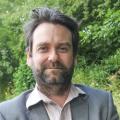
DANCE legends Underworld first gained prominence in the early 1990s, with the critically acclaimed albums Dubnobasswithmyheadman, Second Toughest in the Infants and their classic 1996 single Born Slippy.
Known for their visual style and dynamic live performances, they’ve featured in soundtracks and scores for films, television, and most notably the 2012 London Olympics, but their latest project might just be their most adventurous yet.
Released in October, Underworld’s new album Drift Songs marks the conclusion of a hugely ambitious 52-week plan to create music, film and text pieces, before publishing them every Thursday as part of the band’s on-going, very public recording process. By the end of the Drift series, more new music and film had been released during the project’s one-year duration than in the band’s previous 15 years.
“The most punishing thing in the past for us would be the years between albums,” said Karl Hyde, who first formed Underworld with Rick Smith in 1988 after first working together in Cardiff in 1979. “You would get this little container in which to cram things into and all this stuff would get left behind.
“What this project has made us do is spend much more time together and create a broader container for the breadth of Underworld’s music and it’s forced us to find solutions. We couldn’t just walk away and think ‘maybe we’ll sort it next week’.”
Karl is positive about an experience which has seen the band leave the album / tour treadmill far behind.
“It can be quite demoralising and after 40 years very predictable,” he said. “Predictability is not conducive to the spark you desire when you have a creative career. What’s the point in knowing how it’s all going to turn out?”
After working together for four decades, Karl admits their recent experiences have brought them closer together than at any time in their career.
“Most bands start off as mates but then lot of great bands have fallen apart due to musical differences,” he said. “We’ve done things the other way around. We’ve gone from being not that good mates and over the years we’ve discovered we like each other and get a real buzz from solving problems together.”
Underworld’s rise coincided with a major sea change in the perception of electronic music in the live arena. While acid house had changed the UK’s clubs into more egalitarian and open spaces, Underworld and other bands like the Chemical Brothers and Leftfield rose up and broke through in their wake and began to make an impact in traditional live venues.
“It’s a huge show now with god knows how many buses and crew,” he added. “But for us, our live shows are all about spontaneity and connecting with the audience. People, music, groove, sweat and honesty – those are the main components! It’s been great resizing the show too as a year ago we were playing in these tiny clubs with no screens and just a few lasers and now we’re playing arenas.
Karl and Rick will bring this winning combination to Manchester next week with a gig at the Warehouse Project on Thursday - a return to the city where they launched the Manchester Street Poem project in 2017, which threw a spotlight on the stories of the homeless in the city.
“Manchester is very dear to us,” added Karl. “The project has gone from strength to strength, picking up awards and more importantly changing people’s lives. We’ve always felt it’s important to give something back to the city and I’m up there now at least once a month running workshops.When we actually get to play there it’s fantastic because it’s basically my second home.”
Underworld play Manchester Warehouse Project on Thursday, December 5. Tickets from underworldlive.com/events



Comments: Our rules
We want our comments to be a lively and valuable part of our community - a place where readers can debate and engage with the most important local issues. The ability to comment on our stories is a privilege, not a right, however, and that privilege may be withdrawn if it is abused or misused.
Please report any comments that break our rules.
Read the rules here